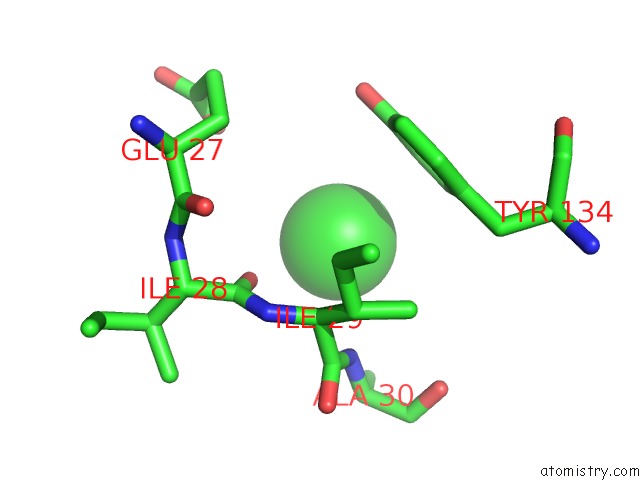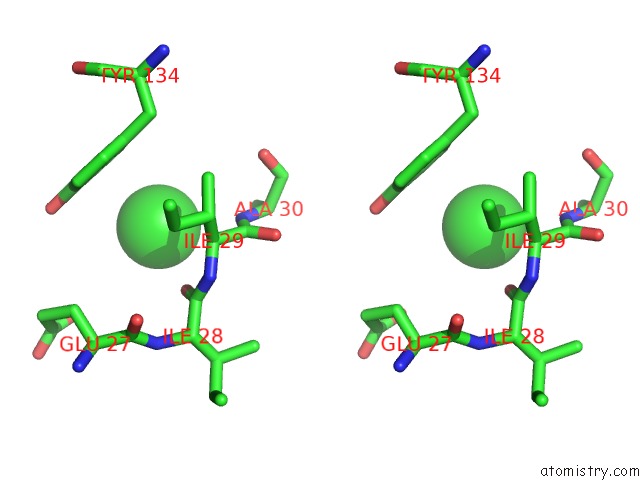Chlorine »
PDB 5aoa-5b1k »
5aqn »
Chlorine in PDB 5aqn: Fragment-Based Screening of HSP70 Sheds Light on the Functional Role of Atp-Binding Site Residues
Enzymatic activity of Fragment-Based Screening of HSP70 Sheds Light on the Functional Role of Atp-Binding Site Residues
All present enzymatic activity of Fragment-Based Screening of HSP70 Sheds Light on the Functional Role of Atp-Binding Site Residues:
3.6.3.51;
3.6.3.51;
Protein crystallography data
The structure of Fragment-Based Screening of HSP70 Sheds Light on the Functional Role of Atp-Binding Site Residues, PDB code: 5aqn
was solved by
A.M.Jones,
I.M.Westwood,
J.D.Osborne,
T.P.Matthews,
M.D.Cheeseman,
M.G.Rowlands,
F.Jeganathan,
R.Burke,
D.Lee,
N.Kadi,
M.Liu,
M.Richards,
C.Mcandrew,
N.Yahya,
S.E.Dobson,
K.Jones,
P.Workman,
I.Collins,
R.L.M.Vanmontfort,
with X-Ray Crystallography technique. A brief refinement statistics is given in the table below:
| Resolution Low / High (Å) | 48.84 / 2.45 |
| Space group | C 1 2 1 |
| Cell size a, b, c (Å), α, β, γ (°) | 233.290, 41.030, 205.250, 90.00, 123.13, 90.00 |
| R / Rfree (%) | 19.3 / 22.8 |
Chlorine Binding Sites:
The binding sites of Chlorine atom in the Fragment-Based Screening of HSP70 Sheds Light on the Functional Role of Atp-Binding Site Residues
(pdb code 5aqn). This binding sites where shown within
5.0 Angstroms radius around Chlorine atom.
In total only one binding site of Chlorine was determined in the Fragment-Based Screening of HSP70 Sheds Light on the Functional Role of Atp-Binding Site Residues, PDB code: 5aqn:
In total only one binding site of Chlorine was determined in the Fragment-Based Screening of HSP70 Sheds Light on the Functional Role of Atp-Binding Site Residues, PDB code: 5aqn:
Chlorine binding site 1 out of 1 in 5aqn
Go back to
Chlorine binding site 1 out
of 1 in the Fragment-Based Screening of HSP70 Sheds Light on the Functional Role of Atp-Binding Site Residues

Mono view

Stereo pair view

Mono view

Stereo pair view
A full contact list of Chlorine with other atoms in the Cl binding
site number 1 of Fragment-Based Screening of HSP70 Sheds Light on the Functional Role of Atp-Binding Site Residues within 5.0Å range:
|
Reference:
A.M.Jones,
I.M.Westwood,
J.D.Osborne,
T.P.Matthews,
M.D.Cheeseman,
M.G.Rowlands,
F.Jeganathan,
R.Burke,
D.Lee,
N.Kadi,
M.Liu,
M.Richards,
C.Mcandrew,
N.Yahya,
S.E.Dobson,
K.Jones,
P.Workman,
I.Collins,
R.L.Van Montfort.
A Fragment-Based Approach Applied to A Highly Flexible Target: Insights and Challenges Towards the Inhibition of HSP70 Isoforms. Sci Rep V. 6 34701 2016.
ISSN: ESSN 2045-2322
PubMed: 27708405
DOI: 10.1038/SREP34701
Page generated: Fri Jul 26 05:24:00 2024
ISSN: ESSN 2045-2322
PubMed: 27708405
DOI: 10.1038/SREP34701
Last articles
Zn in 9J0NZn in 9J0O
Zn in 9J0P
Zn in 9FJX
Zn in 9EKB
Zn in 9C0F
Zn in 9CAH
Zn in 9CH0
Zn in 9CH3
Zn in 9CH1